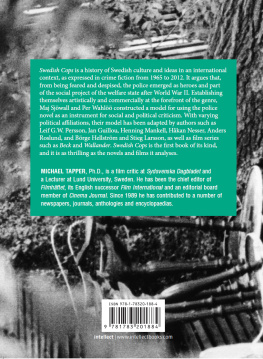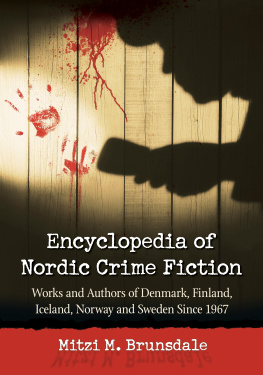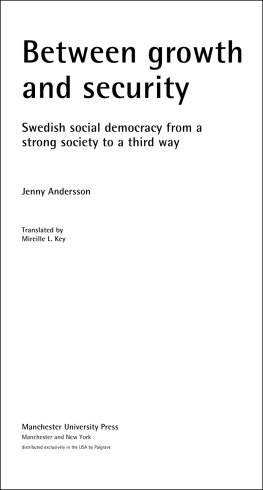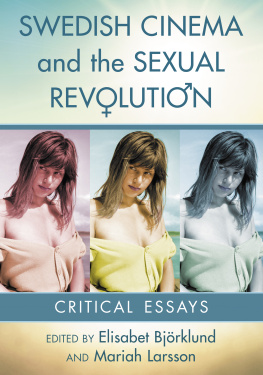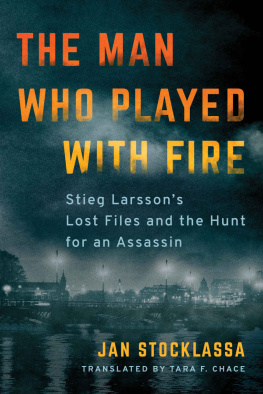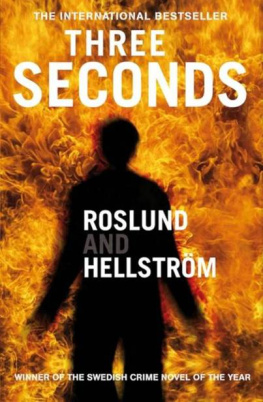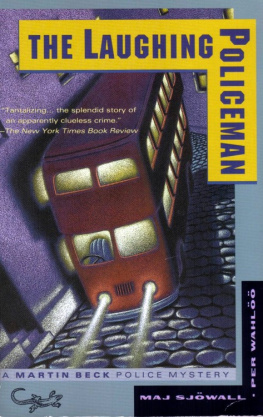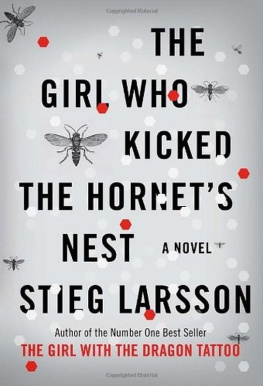Swedish Cops
Swedish Cops:
From Sjwall and Wahl to Stieg Larsson
by Michael Tapper

First published in the UK in 2014 by
Intellect, The Mill, Parnall Road, Fishponds, Bristol, BS16 3JG, UK
First published in the USA in 2014 by
Intellect, The University of Chicago Press, 1427 E. 60th Street,
Chicago, IL 60637, USA
Copyright 2014 Intellect Ltd
All rights reserved. No part of this publication may be reproduced, stored in a retrieval system, or transmitted, in any form or by any means, electronic, mechanical, photocopying, recording, or otherwise, without written permission.
A catalogue record for this book is available from the
British Library.
Cover designer: Stephanie Sarlos
Cover image: TT News Agency/PA
Copy-editor: Lisa Cordaro
Production manager: Tim Elameer
Typesetting: John Teehan
ISBN 978-1-78320-188-4
ePDF ISBN 978-1-78320-279-9
ePub ISBN 978-1-78320-280-5
Printed and bound by Hobbs the Printers Ltd, UK
Contents
Acknowledgements
An Adventure 65 Million Years in the Making is the familiar tagline for Jurassic Park, and looking back on the work on this book I know the feeling. I would like to express my deepest gratitude for the advice and input of history professor Ulf Zander and film studies professor Erik Hedling, both at Lund University, Sweden.
My family deserves a standing ovation for putting up with several years of hard work and for keeping my spirits up when they have been close to rock-bottom. I also want to extend my gratitude to secondhand bookshops around the world for providing me with a library that has shrunk the interior space of my house considerably. A warm osu to my fellow members of IF Lunds Karate Kyokushinkai, for all the friendship and bruises that kept my energy level high throughout this work. Invaluable professional help in the translation and editing process was provided by Paul Norlen; without him I could not possibly have made it.
My deepest gratitude goes to the Swedish Crime Writers Academy, who in 2011 awarded me with the Golden Crowbar for best specialist literature. I am especially grateful, since I shared the limelight that year with one of my favourite authors in the genre: Arne Dahl (awarded for best Swedish crime novel: Viskleken/Chinese Whispers, 2011). For a generous grant to do the English edition I thank the Swedish Writers Union. Finally, I would like to send many warm thoughts to Tim Elameer and the staff at Intellect for handling my book with professional skill.
This book is dedicated to Marita, my wife and partner in crime.
Preface
Swedish Cops: From Sjwall and Wahl to Stieg Larsson is the edited, revised and updated English edition of my dissertation Snuten i skymningslandet: Svenska polisberttelser i roman och film 19652010/The Cop in the Twilight Land: Swedish Police Narratives in Novels and Films 19652010, published in its original Swedish edition (864pp.) by Nordic Academic Press in Lund 2011.
The editing process has been considerable, removing chapters on authors (Olov Svedelid) and film series (Johan Falk), restructuring the other chapters and trimming the reception sections considerably. After reading John-Henri Holmbergs 2010 and 2011 essays about the disastrous translation of Stieg Larssons Millennium series, and talking with my invaluable aid in translating the book, Paul Norlen, I decided not to use the current English translations of the novels treated in this book. Instead, I stuck with the Swedish editions and, if necessary, translated quotations myself with the help of Paul Norlen.
All titles of books, films, articles, etc. are written like this: Original title/English title (author year), when first mentioned in the book. If the title is available in English translation, then the English title is subsequently used; if not, the original title is used. Please, note that the reviews are listed in a separate section at the end of the list of references.
[]
It seems like the 1950s literature has avoided modern collectivism, avoided the special kind of civilization that the 1950s created and that points straight in the direction of the 1960s and 1970s. You can see that in the choice of motifs and settings. We have had vivid portraits of humans in sparsely populated Norrland, in industrial communities and rural societies, just as we have had of people in the world of childhood. We have been treated with sharp allegories and romances in pure pink. We would do away with very little of it. But it seems that the authors come to a halt at the three-room apartments of our suburbs, they step aside from the grocery stores, the subway trains and buses, and they hesitate in front of modern office buildings and service industries. That is the world in which more and more people will live. It does not take much wit to realize that it is a life many find to be one of discomfort, crowding and loneliness.
[]
We can map the modern consumer preferences and housing conditions of collective man, his affiliations to various groups and opinions. It is correct and necessary. We also, and most of all, need a portrait of his humanity.
[]
Thomas Hardy once wrote that literature is the written revolt against accepted things. And Artur Lundkvist can complete with: The moral duty above all is a general discontent. Revolt and discontent have always been the driving forces towards a better society.
Excerpt from Olof Palmes contribution to Politiker och frfattare/Politicians and Authors in Bonniers Litterra Magasin (BLM), 1960, 3.
Note
Palme 1960: 23233.
Introduction
A dazzling yellow field of rape rises toward a deep-blue sky. On the soundtrack muted minor chords make a stark contrast to the bright idyllic summer landscape, as a dark-skinned girl in a dress, plastic bucket in one hand, walks resolutely out into the field. Detective Inspector Wallander arrives at the scene and goes out to talk to the girl. He shows her his police badge while trying to take control of the situation with his calm, reassuring voice but to no effect. The distraught girl pours the content of the can over herself and sets fire to it. Wallander freezes with fear in his eyes. Orange flames kiss the blue sky. Main titles. Yellow letters form the word WALLANDER against a blue background, from which our tired, haggard hero with a three-day stubble looks at us, with melancholy in his eyes. On the soundtrack, Emily Barker sings Nostalgia.
Powerful as David Lynchs allusion to Norman Rockwell in the opening of Blue Velvet (1986), the overture to the British-Swedish production of Wallander in 2008 summarizes the theme of a paradise lapsed into a nightmare. However, in this case the implied criticism is not of civilization in general or just any western world country. The colour palette stresses the blue-and-yellow symbolism taken from the Swedish flag so hard that this could only be about Sweden as heaven and hell. Barkers song diagnoses the condition of both Wallander and the country: nostalgia. The melancholic lamentation for the loss of a Golden Age, the post-war welfare state and its promises that has become a keyword in commentary and analysis of Swedish crime fiction in print, film and TV. Also, it is faction a crossroads of a carefully constructed mix of fact, fiction and myth and it has gained international popularity as well as seeping into the Swedish self-image.

